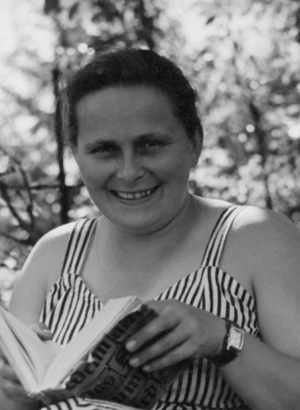“I WAS FIGHTING FOR MYSELF. NOT FOR MY FAMILY OR FOR ANYONE ELSE. I DIDN’T WANT TO LIVE UNDER THIS REGIME!”
My mother was involved in the resistance movement as part of the Communist Youth Union. In 1940, after her group was betrayed, she was arrested and sentenced to two years in prison. She was subsequently taken into protective custody. Protective custody at that time meant deportation to a concentration camp. She was deported to Auschwitz with the comment “Return is not desirable!” Then she was transferred to Birkenau extermination camp for some time. She was imprisoned there until January 1945. She was then sent on her first death march, the destination being Ravensbrück. There she had to spend some time in the Uckermark camp.
During her second death march in April 1945, she and four other friends were able to escape into a forest. From there they headed for Vienna, most of the time walking on foot. For short parts of the journey they were able to go by train or horse-drawn carriage.
She never regretted the path she had taken. She was always aware of the possible consequences if her involvement in the resistance was revealed. When she spoke about her arrest, she always described it with humour: “The Gestapo came at seven in the morning. Besides me, my mother, my two sisters and my grandmother were present. The men searched our house, but they were delayed by my demented grandmother, who was only in her underwear. She had just been to the toilet first thing in the morning, and she thought it extremely insolent of members of the male sex to interrupt her in such a rude way and she made their lives suitably difficult. In the meantime, my middle sister was able to tear up all the leaflets and get rid of them down the back toilet.
”For my mother it was always her great wish to tell the following generations what had enabled these horrific acts to happen: hatred, fear and disloyalty. No space for fascism means, among other things, advocating for peace and fighting for it.
We never talked about it in this sense. If I can interpret her here, however, I would say that Ravensbrück was a place of remembrance for her, but above all a reminder for future generations, although the time she spent here was only a fraction of the total time she was interned.
Vera Modjawer
Austria
Barbara Hirsch’s daughter
